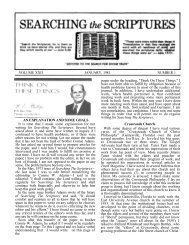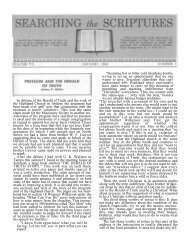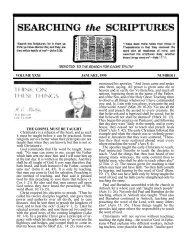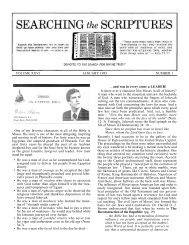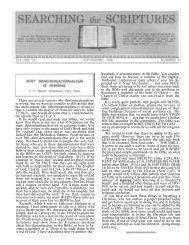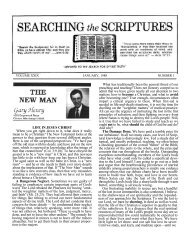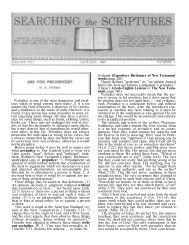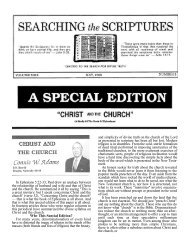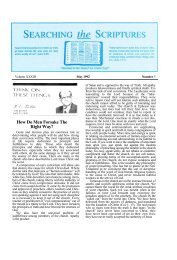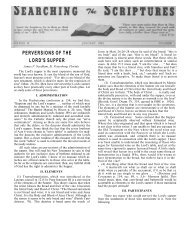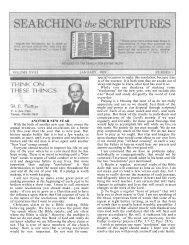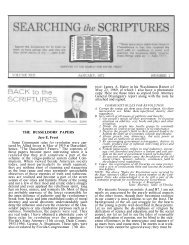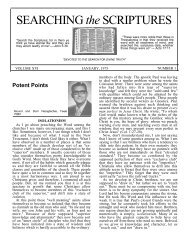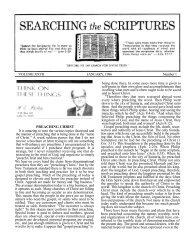Volume 21 – 1980 (PDF) - Searching The Scriptures
Volume 21 – 1980 (PDF) - Searching The Scriptures
Volume 21 – 1980 (PDF) - Searching The Scriptures
You also want an ePaper? Increase the reach of your titles
YUMPU automatically turns print PDFs into web optimized ePapers that Google loves.
Page 4<br />
individual conscience in which the choice and action<br />
of one does not affect that of another. <strong>The</strong>re have<br />
been times when the discussion got heated. A<br />
potential feud is possible whenever you have the<br />
parents of a conscientious objector in the same Bible<br />
class with the parents of a marine, or member of any<br />
other combat unit and the passage for study in<br />
Romans 13. In all such cases, brethren ought to be<br />
able to state their views and then respect the<br />
sensitivities and consciences of those of contrary<br />
persuasion. Some have challenged the patriotism<br />
of those who differed from their choice. In reality,<br />
the most patriotic thing any of us can do in wartime or<br />
peacetime is to be a devout Christian, contributing<br />
the salt, light and leaven of a godly character, for<br />
after all, "righteousness exalts a nation but sin is a<br />
reproach to any people" (Prov. 14:34).<br />
Of necessity, these questions will have to be<br />
pondered by young men and anxious parents in the<br />
days ahead. <strong>The</strong> prospect of war on any scale in a<br />
frightful thing to contemplate. <strong>The</strong> unrighteous<br />
environments which surround military bases around<br />
the world and entice young people far removed from<br />
the direct influences of godly parents and interested<br />
brethren have contributed much to the spiritual<br />
decline and downfall of many. On the other hand, the<br />
presence of young people who were devoted to the<br />
Lord even under adverse circumstances has been<br />
responsible for the establishment of congregations all<br />
over the world. Whatever route one takes is not easy<br />
to pursue especially in wartime.<br />
So then, brethren, and especially young men and<br />
concerned parents, study the matter in light of what<br />
the Bible teaches. Keep cool heads and honest hearts.<br />
For the sake of helping clarify these issues, we are<br />
willing to carry an article of reasonable length,<br />
written in the right spirit, from a representative<br />
brother on either side of this matter. We do not<br />
propose to turn this paper over to a running battle on<br />
this issue, but feel that the times warrant some help<br />
for all of us. Stay tuned.<br />
Before we study question 4 and the Baptist<br />
answer, we need to make a careful study of the term<br />
"Baptist" and try to settle the issue on what name<br />
we are to wear. This has been referred to, and will be<br />
again in this study, so we need to learn the truth on<br />
the name controversy before we go further.<br />
What did the name "Baptist" mean when used<br />
with reference to John in the New Testament? When<br />
we learn this, we should know whether or not we are<br />
to wear the name today, or whether it can or should<br />
be applied to the average member of the Baptist<br />
Church.<br />
What did Zacharias and Elisabeth name their son?<br />
"And his mother answered and said, Not so; but he<br />
shall be called John, . . . And they made signs to his<br />
father, how he would have him called. And he asked<br />
for a writing table, and wrote, saying, His name is<br />
John" (Luke 1:60, 62, 63). That settles that! <strong>The</strong>n<br />
why was he called "Baptist" and what does the term<br />
mean?<br />
"BAPTISTES a baptist, is used only of John the<br />
Baptist, and only in the Synoptists, 14 times."<br />
(Expository Dictionary of N.T. Words, W.E. Vine, p.<br />
97) ". . .a baptizer; one who administers the rite of<br />
baptism ..." (Thayer's Greek-English Lexicon, p.<br />
95).<br />
It is obvious that no one today can wear the name<br />
Baptist with the meaning that it had when used with<br />
reference to John. <strong>The</strong> only other meaning is "a<br />
baptizer" or one who baptizes. Members of the<br />
Baptist denomination do not baptize, therefore they<br />
are not baptists or baptizers. In the true sense of the<br />
term, anyone who baptizes people is a baptizer, but it<br />
is something to be done and not a name to be worn.<br />
I have in my library a copy of a translation called<br />
"<strong>The</strong> American Bible Union New Testament." It was<br />
first published in 1864. It grew out of a controversy<br />
which the Baptists had with the American Bible<br />
Society over whether the Greek word for baptize or<br />
baptism should be translated by the English term<br />
"immerse" or an equivalent. <strong>The</strong> Society discouraged<br />
such rendering, since those who accepted sprinkling<br />
and pouring for baptism could not conscientiously<br />
circulate a version which consistently employed the<br />
word immerse or an equivalent. "<strong>The</strong> Baptists took<br />
offense and a controversy ensued." (Schaff-Herzog<br />
Encyclopedia of Religious Knowledge, Vol. II, p. 92).<br />
<strong>The</strong> direct outcome of the controversy was the<br />
formation of the American Bible Union. This new<br />
society decided to make a translation which would<br />
conform as nearly as possible to the original, and



